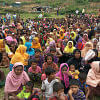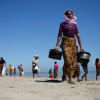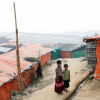UK MPs concerned over ‘Rohingya repatriation process’

The UK parliament members have expressed grave concern over the plan of repatriating Rohingyas from Bangladesh to Myanmar "without any clear understanding of their legal status and destination".
In a report published yesterday, the Commons International Development Committee of the UK Parliament said it was clear that the Myanmar army used rape and sexual violence as the weapons of war.
"The potential return of 100,000 Rohingya to Myanmar without any clear understanding of their legal status, destination, or even whether they have volunteered for the return trip, is a matter of grave concern," it said.
According to the report, the committee said plans to begin repatriation for the displaced Rohingya people from Bangladesh to Myanmar are well underway without evidence of consultation or involvement with the community.
The UK MPs on the committee however agreed that the required conditions for the safe return of the Rohingyas to Myanmar must include their safety, security, and access to fundamental human rights.
Previous episodes of displacement and return of the Rohingyas and other ethnic minorities in Myanmar over the last 20 years 'do not inspire confidence', the report said.
The committee welcomed the UK government's 'five-point plan' for the Rohingya people and Myanmar, recognising the challenges and ambitions behind each strand of the concept.
The UK government's 'five-point plan' calls for ending violence by Myanmar's security forces, securing full humanitarian access, allowing refugees to return in a voluntary, safe and dignified manner, implementing the recommendations of the report by the former UN chief Kofi Annan-led commission, and full access and cooperation with the UN's fact-finding mission.
However, it said that returning the Rohingya to live in Myanmar-run temporary camps with the threat of future deprivation and violence is unacceptable.
"The Rohingya Crisis has provided the international community with an unwanted test case of the best way to respond to humanitarian crises and the needs of the displaced people involved," said Stephen Twigg MP, also the chair of the committee.
"We are going to have to work much harder to protect populations from threats and humanitarian crises," he said, adding, "The UK has 70 experts ready to deploy to Bangladesh to assist with this situation and yet we haven't sent them. This flies in the face of the UK's commitment to deter gender-based violence. "
"It is unacceptable that it is taking the UK so long to send any specialist resources on sexual violence to advise on the experiences of the Rohingya in Rakhine State," he also said.
"For decades, the Rohingya people in Rakhine state endured discrimination, marginalisation and abuse. The Rohingya have paid a heavy price for the lack of consensus amongst the international community on how and when to decide to act effectively. We cannot fail them again," the UK MP added.
Terming the plight of the Rohingya people a "huge human tragedy", the committee said in the report that Myanmar's actions have "imposed human suffering on hundreds of thousands of people and presented the world with a huge bill for humanitarian relief estimated to amount to a billion pounds per year."
"There is also the chilling prospect of yet another long-term, politically intractable, cross-border displacement where the prospects of it becoming a powder keg of radicalisation seem very real."
Bangladesh was "proceeding apace" with the return of a first tranche of Rohingya people, according to the report.
The committee also said that there is a need to find ways for the Rohingyas to develop livelihoods and become more self-reliant following their return.
This report is the first element of the committee's examination of the UK government's Department For International Development (DFID)'s work in Bangladesh and Myanmar.

 For all latest news, follow The Daily Star's Google News channel.
For all latest news, follow The Daily Star's Google News channel. 








Comments